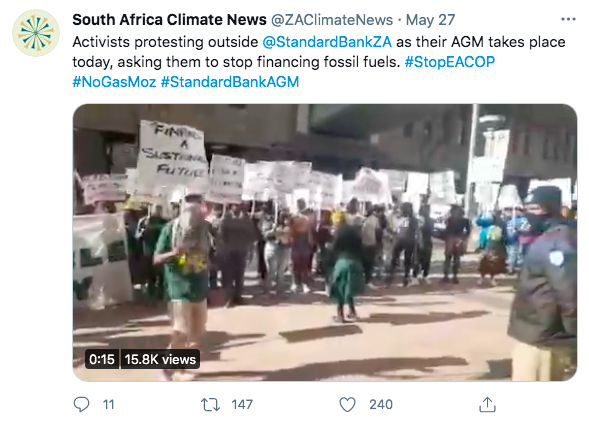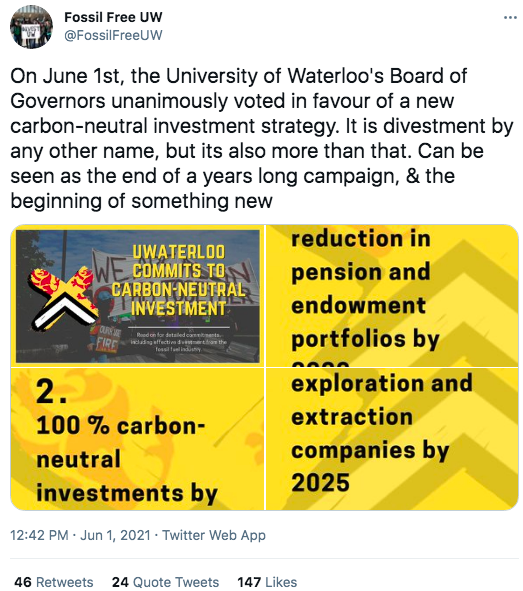When we think about the causes of climate breakdown, most of us picture smoke stacks or tailpipes rather than bankers and boardrooms, but climate activists are increasingly embracing the old detective’s adage — follow the money.
Since the Paris Agreement, the world’s biggest banks have poured more than US$3.8 trillion into fossil fuels, almost 40 per cent specifically into expanding the fossil fuel sector.
Canadian banks really stand out on the global list — three of them are in the Top 10. Canada’s largest banks have put over C$726 billion into fossil fuel companies since 2015.
RBC is the biggest Canadian player and ranks as the fifth largest fossil fuel funder worldwide. The bank formerly known as the Royal Bank of Canada has dedicated more than $208 billion to fossil fuels since the Paris Agreement.
This week, over 600 climate organizers from across Canada gathered online for a “People’s AGM” organized by Leadnow to chart a nationwide campaign focused on RBC. The event was co-sponsored by groups representing youth, grandparents and some of the country’s big environmental groups, including Greenpeace and Stand.earth.
Wet'suwet'en Hereditary Chief Woos spoke to attendees about the impacts of the RBC-backed Coastal GasLink pipeline in northern B.C. A youth organizer from Minnesota gave an update on the organizing against another RBC-backed pipeline — Enbridge’s Line 3. An Australian campaigner gave tactical advice gleaned from their campaigns against banks financing coal mines.
Sophie Krouse, from the Canadian youth climate group Banking on a Better Future, described protests the group has already organized at RBC branches alongside the wonderfully acronymed GASP (Grandmothers Act to Save the Planet). Krouse noted the “gap between what employees and customers think about RBC and what the company is actually doing,” and urged attendees to join an upcoming day of actions on June 8.
The Paris Agreement specifically called on the finance sector to redirect the global flow of money, and it’s become a major arena for climate action. Investors are pushing ever more aggressively from the inside. Activist groups are protesting outside. Regulators are trying to figure out rules for assessing climate risk. Analysts are warning about carbon bubbles and stranded assets. The fossil fuel divestment movement keeps notching up victories (as we’ll see in this week’s news roundup).
Bank campaigns are proliferating around the world. In the U.S., climate justice groups have banded together to “Stop the Money Pipeline,” targeting a range of banks, insurance companies, and pension funds as well as other asset managers and institutional investors. There are now similar campaigns all over the globe.

For its part, RBC has begun to move. CEO Dave McKay says that “climate change is one of the most pressing issues of our times.” The bank has adopted the reporting system catalyzed by Mark Carney (the Task Force on Climate-Related Financial Disclosures, or TCFD) and this year joined the Center for Climate-Aligned Finance organized by Rocky Mountain Institute.
Beyond those procedural steps, RBC has responded to pressure campaigns and prohibited any financing for drilling in the Arctic National Wildlife Refuge. The company now has policies limiting its support for coal and for Arctic drilling more broadly, although in neither case are the policies complete bans.
In February, RBC pledged to get to net zero by 2050 for its financed emissions. As with so many corporate net-zero announcements, the company hasn’t yet announced the meaningful near-term commitments to get itself on track.
Let’s start this week’s roundup with some related developments in the world of climate and money.
The Roundup
Exxon loses a third board member
Last week, we looked at Big Oil’s very bad day. At that point, ExxonMobil had lost at least two board members in a shareholder fight over its climate strategy, and the votes were still being counted. This week, the oil giant conceded that shareholders had unseated a third.
It’s a stunning development — Exxon (Exxon?!?) lost one-quarter of its board to climate-concerned investors at this year’s shareholder meeting. The Associated Press reports it’s “another blow to fossil fuel companies facing growing pressure to refocus their businesses in light of a dangerously warming world.”
“The alternative slate of directors had the support of some of the largest money managers in the world, including the nation's largest public pension funds.”
There are a couple of interesting side notes to the Exxon story. In a separate vote, shareholders overwhelmingly passed a resolution for Exxon to report on how its political lobbying aligns (or doesn’t) with the Paris Agreement. Perhaps most humiliating for CEO Darren Woods, the third board member to be ousted is the former CEO of Petronas, personally recruited by Woods just five months ago.
Trans Mountain loses another insurer
Argo Group, part of the Lloyd’s of London syndicate, is the latest insurer dropping Trans Mountain following pressure from Indigenous and climate activists, reports National Observer’s John Woodside.
“This type of project is not currently within Argo's risk appetite,” Argo spokesperson David Snowden said in an email.
University of Waterloo
After a multi-year campaign by students and faculty, the University of Waterloo has committed to making its investments “carbon-neutral.” The plan is to go beyond divestment by removing investments in fossil fuels by 2025 and achieving carbon neutrality across its pensions and endowments by 2040.

Other Canadian universities with divestment plans include Laval, Concordia, the University of British Columbia and Guelph. You can find an up-to-date, searchable list of the 1,325 institutions around the world that are fully or partially divesting at gofossilfree.org.
Climate change is a public health emergency
“What is true for COVID-19, is true for climate change. Climate change is a public health emergency and must be treated as such.”
That’s a quote from the head of the Canadian Public Health Association. Ian Culbert was speaking at the release of a new report projecting costs in the billions of dollars from health impacts due to heat waves, air pollution, Lyme disease and mental health in Canada.
As is so often the case, the impacts will hit the most vulnerable and disadvantaged people hardest, drastically increasing premature deaths and hospitalizations.
The Canadian report comes on the heels of a global survey published earlier in the week that found that climate breakdown is already responsible for over one-third of heat deaths. And that’s happening while we’re still well below the supposedly “safe” level of heating.
Severe drought in western U.S.
72 per cent of the western U.S. is currently in “severe” drought or worse, and it’s only the beginning of June. Check out this photo essay in The Guardian to get a vivid sense of the rivers, lakes and reservoirs.
Canada’s record on climate pollution is the worst in the G7
Not only have we not cut our climate pollution since the Paris Agreement, Canada had the biggest increase in emissions among G7 countries. Five of the other countries did make cuts, and the U.S. had a marginal increase.
But the best on green recovery
Despite all the hype about building back better from COVID, the G7 countries have done a miserable job allocating money. In total, they have pumped more money into fossil fuels than clean energy.
Only Canada and Japan stand out for committing more money to clean energy than fossil fuels. But Japan spent much less per capita. And you’ll notice that Canada is still allocating more to fossil fuels than any other country except the U.K.
But Canada’s federal government has actually done a better job on recovery than the top line numbers indicate because the tracking includes provincial decisions like Alberta’s $5.6 billion to the Keystone XL pipeline.
ReconAfrica: a global outcry over endangered elephants
The Globe and Mail has a feature on ReconAfrica, a Canadian company with drilling licences in Namibia and Botswana. “The project, still in its exploration drilling phase, has become a global cause célèbre, with Namibia’s endangered elephants at the heart of it.”
“This sparsely populated corner of Southern Africa is now a battleground between a Calgary-based company and an informal coalition of environmentalists, Hollywood celebrities, Indigenous activists, wildlife conservationists and Anglican bishops,” report Geoffrey York and Emma Graney.
On Friday, 185 organizations from around the world released an open letter to Justin Trudeau calling on the Canadian government to “investigate and take action” on ReconAfrica. Signatories include Amnesty International’s Southern Africa and Canada Offices, Indigenous Climate Action, the Anglican Bishop of Namibia, Fridays for Future Windhoek, Namibia Women’s Association, and KAIROS Canada, among others.
I’ll leave you with something a little more light-hearted. This segment from Samantha Bee’s show Full Frontal spoofs the gas industry’s campaigns against electrification. The industry has been paying social media influencers to promote gas stoves as part of its efforts to stop cities from banning gas hookups into new homes.

That’s all for this week. Thank you for reading Zero Carbon. I know you have lots of outlets, media feeds, podcasts and newsletters to choose from. If you know people who might be interested, please forward this email along.
I’d love to hear from you: [email protected]. I can’t promise to answer every email but I do promise to read ‘em all.



